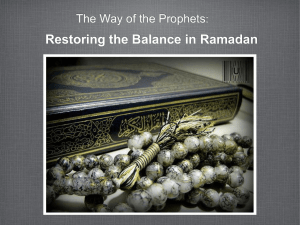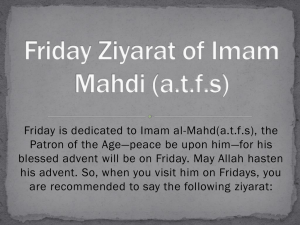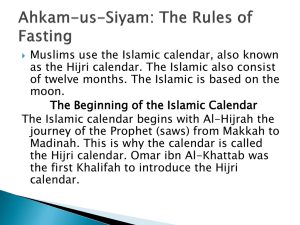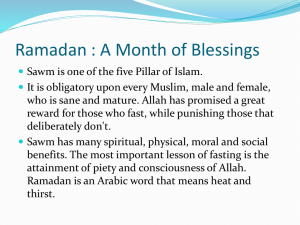Ramadan Gift - YasSarNal QuR`aN
advertisement
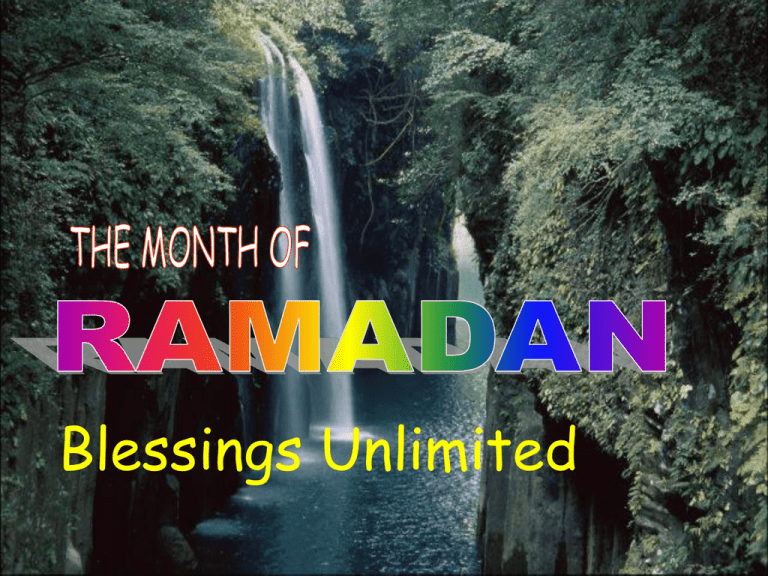
Blessings Unlimited Fasting in General “Fasting is observed not only by human beings but by all creatures in nature including animals and trees. Wild animals in the region of heavy snowfall go without food for weeks and months and still survive…. This state of abstention from food and drink results in rejuvenation and renewal of life….. Fasting gives them strength and vigor. Similarly trees shed their leaves in winter when they are not watered. They are in a state of fast. At the end of the season new leaves sprout forth, new buds and fresh flowers bloom, the trees bear fruit”. (Quoted from Dr.Geoffery by Dr. Muhammad Hamidullah in The Emergence of Islam, the English version of his famous Bahawalpur lectures) General Facts: * Fasting was prescribed by Allah on all those people who went before the emergence of Prophet Muhammad (sal-lal-lahu alaihi wa sallam) * Fasting was made compulsory on the followers of Prophet Muhammad (sal-lal-lahu alaihi wa sallam) in the second year of Hijrah The Prophet (sal-lal-lahu alaihi wa sallam) said: There is Zakah on everything and the Zakah of the body is Fasting” (Ibn Maja, Abu Huraira) FASTING – A pillar of Islam To observe fast during the month of Ramadan is to establish one of the five pillars of faith. One who doesn’t observe fast in the month of Ramadan despite not being sick or not on a journey, doesn’t fulfill the condition of being a Muslim! The Prophet of Islam (sal-lal-lahu alaihi wa sallam) cursed those who do not take full advantage of Ramadan: that is – those, in spite of being healthy and in station, do not observe fast in the month of Ramadan. One Speech Tells It All! It is reported from Salman Farsi (RA) that the Prophet Muhammad (sal-lal-lahu alaihi wa sallam) delivered a speech on the last day of Shaban in which he said: “O mankind! You are on the threshold of a solemn month, a month of immense blessings. It is a month whose one night is better than a thousand months. “Allah has prescribed fasting compulsory in this month and made Qiyamul layl (taraweeh prayers) optional in this month. “Whosoever willingly and with good intention does one good act in this month, will have the merit of having done an obligatory act of other months; and whoever does an obligatory act in this month, will have the reward equal to seventy obligatory acts of other months. “This is a month of endurance and the reward of endurance is Paradise; and this is a month of caring and sharing with the poor and needy people of the community”. (Mishkaat) Why Fast in Ramadan? Why not in other months? The Answer is in Chapter 2, Verse 185 wherein Allah declares and commands the Muslims thus: “Ramadan is the month in which the Qur'an was sent down : (this Book is) a perfect guidance for mankind and consists of clear teachings which show the right way and are a criterion of Truth and falsehood. Therefore from now on whoever witnesses it, it is obligatory on him to fast the whole month, but if one be ill or on a journey, he should make up for the same number by fasting on other days. Allah desires to show leniency to you and does not desire to show any hardship. Therefore this method is being shown to you so that you may complete the number of Fast days and glorify Allah for the Guidance He has shown to you and be grateful to Him.” Explaining the verse 2:185, Maulana Maududi writes: “It is clear from this verse that fasting in Ramadan has been prescribed not only as a form of worship and a training for piety, but also to show gratitude for the great blessing of the Revelation of the Qur'an during the month of Ramadan. And the best way to show gratitude for a favour is to fulfill the object for which it was bestowed and to prepare oneself for its completion as best as one can. The object for which Allah has bestowed the Qur'an upon us is to reveal His Will so that we may fulfill it ourselves and persuade others to do the same. Fasting provides the best training for the fulfillment of this object and is both a devotion and a sign of gratitude for the favour shown in the form of the Qur'an.” The Purpose of a Muslim’s fast Allah, the Most Gracious, while enjoining fast on the Muslim Ummah spells out the purpose of fast thus: “O You who believe! Fasting is prescribed to you as it was prescribed to those before you, that you may become self-restraint” (2: 183) Fasting in which the spirit of fast is not observed is only an exercise in starvation and not really a fasting at all. This is what the Prophet (sal-lal-lahu alaihi wa sallam) meant when he said: “Whosoever does not give up telling lies, or acting in a false manner, Allah has no need of his staying away from food or drink”. The emphasis is not merely against uttering falsehood, but on more comprehensive acting in false manner which embraces all various forms of disobedience to Allah. He who professes to recognize Allah as such, and yet disobeys Him, in effect belies his professions. Allah does not intend to keep our bellies empty for a certain period. The Prophet (sal-lal-lahu alaihi wa sallam) said: “Many are the observers of fast who gain nothing from their fast but thirst and hunger. Many are the people who stand in night in prayers and gain nothing from their prayers except sleeplessness”. The purpose of fast, therefore, is to make Muslims become Allah-conscious and adopt righteousness in thought and deed. A Sure Way to Salvation Firmness of belief and sincere evaluation of one’s deeds (Imaan and Ehtesaab) are two necessary means to get one’s past sins forgiven in the month of Ramadan. The gems coming out from the lips of the Prophet (sal-lallahu alaihi wa sallam) glitter like this: “Whoever fasts in the month of Ramadan with firmness of belief and stock taking of his deeds, then all his past sins will be forgiven. “Whoever stands in prayers in the month of Ramadan with firmness of belief and stock taking of his deeds, then all his past sins will be forgiven”. (Bukhari, narrated by Abu Huraira) Laylatul Qadr Allah’s Declaration of the Specialty of the Night “We have indeed revealed this (Qur’an) in the Night of Power: And what will explain to you what the Night of Power is! The Night of Power is better than a thousand Months. Therein come down the angels and the Spirit by the permission of their Lord (on every errand): (The Night is full of) Peace until the rise of Morn!” (Al Qur’an, Chapter 97) The Golden Moments The golden moments of Ramadan are more manifest in the Laylatul Qadr. The Prophet (sal-lal-lahu alaihi wa sallam) said: “A month has come to you in which there is a night which is better than a thousand months. Whoever deprives himself of its blessings, is deprived of all blessings. And none is deprived of the blessings of the Night of Power except the most unfortunate”. This loving command and caution should make all Muslims become intensely serious and sincere in striving to attain the blessings of Laylatul Qadr. May Allah guide us to take this hadith in all earnest. Striving hard & straining one’s nerves Prophet Muhammad (sal-lal-lahu alaihi wa sallam) did not specify a particular night to be Laylatul Qadr. By saying, “Seek Laylatul Qadr among the odd nights during the last ten nights of Ramadan”, the Prophet (sal-lal-lahu alaihi wa sallam) has kept it a secret. Here in lies a Muslim’s thrill. A sublime thrill in striving to live the nights in worship and glorification of the Lord Almighty! The whole idea boils down to the fact that if you want to aim higher and go beyond the sky, you need to strive hard. Precious things can’t be attained just like that! A million dollar question! Millions of Muslims the world over spend most of their time in Ramadan reading the Qur’an. Alhamdulillah! But then how many of us read the Qur’an with understanding? Allah addresses the human minds and hearts in several places, for e.g. “Do they not then earnestly seek to understand the Qur’an, or are their hearts locked up by them? (47:24) “And We have indeed made the Qur’an easy to understand and remember: then is there any that will receive admonition? (This Question is repeated 4 times in Surah Al Qamar - 54:17, 22, 32 & 40) “We have revealed for you (o men!) a book in which is a Message for you: will you not then understand?” (21:10) The interrogative “Afala Ta’qiloon?” can also be translated as: “Don’t you have brains? Can’t you apply your minds to what is being said in the Qur’an?” Qur’anic vision & Beseeching Allah’s Help: Hazrat Umar (R.A) shows the Way By far the most comprehensive dua that a Reader of the Qur’an can offer at the end of his reading, beseeching Allah’s help and guidance, is the Dua of Caliph Umar bin al Khattab (R.A): اللهم ارزقني التف ّكر والتدبّر بما يتلوه لساني من كتابك والفهم له والمعرفة بمعانيه والنّظر في عجائبه والعمل بذالك ما بقيت إنّك على ك ّل شىء قدير Translation ………. “O Allah! Whatever my tongue recites from Your Book, grant me the favor to reflect upon it. O Allah! Bestow upon me the understanding of it. Vouchsafe to me the knowledge of its meaning and spirit, and the vision to see its niceties. Grant me the favor to act according to its injunctions as long as I live. Certainly You have power over all things”. While we observe fast in the month of Ramadan, let us try to read the Qur’an and imbibe the spirit of this dua. May Allah guide us to observe fast in a true Islamic way so that we become worthy inheritors of Paradise (aameen) Jazakallahu Khairan Kaseera! MUQITH MUJTABA ALI muqith_ali@yahoo.co.in

